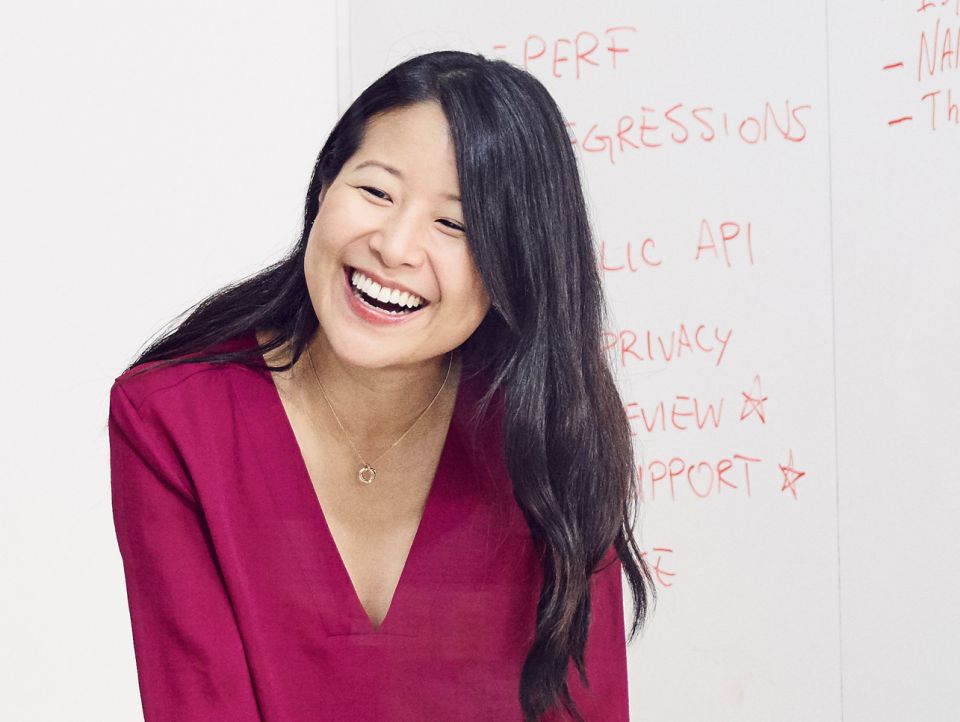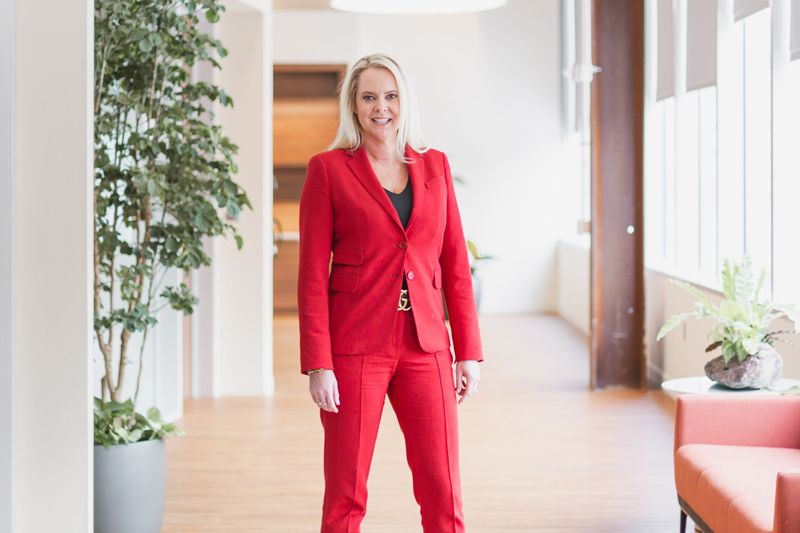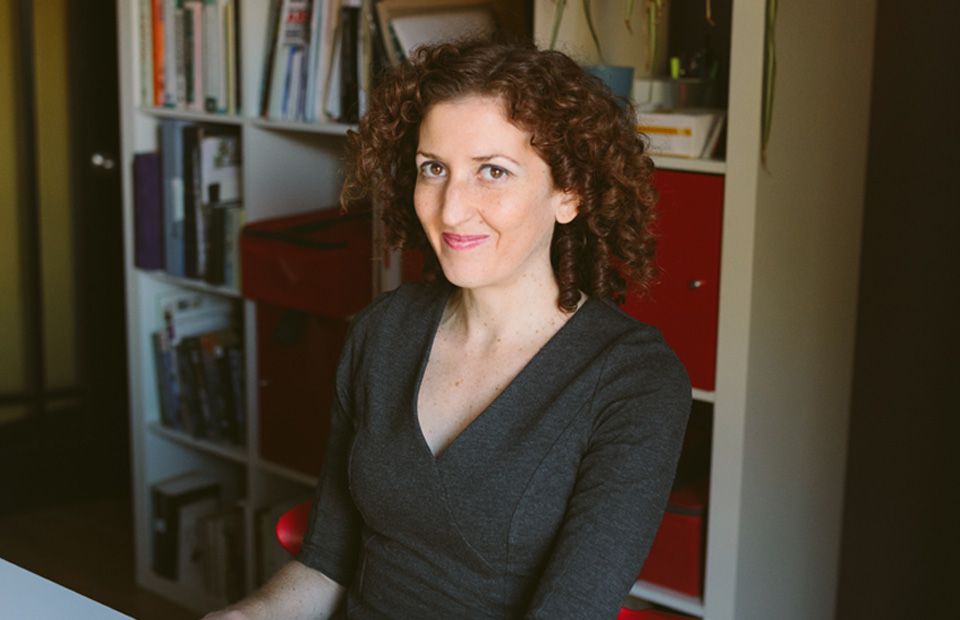Having grown up in Silicon Valley under the care of two techie parents, it’s not hard to imagine where Mercedes Bent’s love for entrepreneurship and tech began. Yet it took a bit of time spent in the financial world for those instincts to be fully realized. Making the switch to tech taught Mercedes a valuable lesson—that it’s never too late to pursue your passions. Now the Global Director of New Ventures at General Assembly, Mercedes spends her days helping others like herself—those looking to explore new career options and further their educations, both on and offline.
Earlier this year, Mercedes launched the Opportunity Fund, designed to provide scholarships to underrepresented groups for GA’s Web Development Immersive program. For those intrigued by a tech career, Mercedes hopes to dispel the myth of a “streamlined path,” believing the more controlled journey up the proverbial ladder is likely to be deprived of real opportunities for success. Instead, this Contessa encourages calculated risk-taking—especially by women—for those who want to really test their limits and prove their potential.
To help prioritize her daily life, Mercedes employs a “three things per day” rule, ending the workday writing down three tasks she hopes to accomplish the following day. Compared to her time in finance, the tech world is more flexible, making self-discipline a necessary skill. Mercedes offers one open-ended piece of advice to women trying to navigate their passions: think about what draws you in, and ask yourself…could you do it every day for 20 years? If so, you’re on the right track!
Her Starting Point
Many people find the transition between college and “real life” a bit daunting. Can you tell us about your journey between the two? What was your first job post-college?
I started out in finance, working as a Financial Analyst in the Private Wealth Management group at Goldman Sachs. I learned a ton and am glad I had the experience. I realize now that when I was a senior in college, I had no idea how to look for a job or explore my interests. I didn’t think very much about my next step in life. I pretty much had three objectives for my first job: make enough money to enjoy life, live in NYC and do something where I could learn transferable skills. This is one reason I was so drawn to General Assembly, I wanted to help people who were like me, who hadn’t explored their career options and needed relevant skills.
When did your passion for the tech world begin, and what first steps did you take in order to establish yourself as a pro?
My parents worked in tech and I grew up in Cupertino, California (Silicon Valley). My passion for entrepreneurship and transforming businesses out of ideas started at our kitchen table where we used to debate future technologies. For a long time, I didn’t really understand that there were other professions that weren’t centered on building new products and companies.
When I woke up one day in finance and realized I had always known that I wanted to work in tech, I felt like I had lost a lot of time. I originally intended to major in Computer Science and ended up majoring in Economics, but never lost interest in the subject.
My first step was realizing that it’s never too late. Then I had to figure out how to get into the industry and convince people I wasn’t obsessed with “startup mania.” I actually wrote a whole blog post on how to make the jump from corporate to startup.
Once in the industry I focused on adjusting to the culture. You can only succeed so much as your work is accepted by others, either validated by the market or accepted internally.
What do you love most about working at General Assembly? What is the company culture like?
I love our mission to create a global community of individuals empowered to pursue work they love through tech education, and the fact that we are executing on it. Everyone is extremely driven to improve education, create a world of more technologists and/or help people find meaningful careers in tech, business and design.
I also love the ability to turn your ideas into reality; GA is the opposite of a bureaucratic environment. Earlier this year, I was able to launch the Opportunity Fund because others here—especially our co-founder Matt Brimer—recognized the need for increased diversity in tech, and put the resources behind the initiative to make it a reality. The Opportunity Fund provides scholarships for underrepresented groups (women, African Americans/Latinos, veterans) to take GA’s flagship Web Development Immersive program, a full-time coding school that turns you from a beginner into a junior web developer. It’s our first big stab at tackling the problem of diversity in tech.
We partnered with Google, Microsoft, Nas (yes, the rapper!), PayPal and Alexis Ohanian (founder of Reddit) to launch this important initiative. One of our work values at GA is “the first time is handmade” and while this was a daunting project to initiate on top of my other responsibilities, knowing that GA encourages and supported me and the process of developing this in a lean manner allowed me to push it forward.
Do you recommend that people interested in working in tech or startups embark on a streamlined path or explore a little more?
There isn’t really such a thing as a streamlined path. You can try to plan as much as you want, but in my experience the more you try to carefully chart and control your career, the more likely you are to miss out on important opportunities that necessitate some risk taking. The tech world is very accepting of alternative backgrounds. We don’t care about qualifications so much as we care about whether you can demonstrate that you can do the work.
It’s all about the amount of risk you’re willing to take on. I really encourage everyone to stretch their risk profile because it helps you understand who you are and where your limits lie—I especially encourage women to do some risk-stretching, since we’re prone to seeking jobs we’re overqualified for. One of the most beautiful parts about growing up is getting to know yourself better and loving the person you find. I know I wouldn’t have found out who I was if I had stuck to a streamlined path.
So, I recommend that people interested in working in tech (1) take more calculated risks, (2) constantly work to improve themselves and (3) find avenues to demonstrate their potential even before they join the tech world.
Her Big Break
How do you stay organized? What tools/resources do you utilize (ie. iPhone, apps, etc.)?
It’s strange, but I have a terrible memory when it comes to anything outside of work. I’m constantly misplacing my favorite jewelry, and I’m terrible with names and faces; but my work-related to-do list is one area where I have an elephant memory. It’s aided by my zealous use of Google Apps for Business. I use Google Spreadsheets for managing projects, managing my team’s workload, product management and much more. I’ve tried several project management tools: Trello, Asana, etc. but I still prefer to use customized spreadsheets.
I also follow the “three things per day” rule. I once heard about a great executive who never left the office for the day without writing down the three things they wanted to accomplish the next day. Following this advice has helped me prioritize big initiatives and push forward the “really hard things” (a la Ben Horowitz’s book The Hard Thing about Hard Things) without getting sidetracked by the day-to-day emails, meetings, questions and emergencies.
If we had the chance to peek at your schedule, what would an average day look like?
My average day starts at 6:00 a.m. when I wake up and check my phone for anything that needs immediate attention. We’re a global education company, so our Australian and Asian offices are having their day while I’m asleep and Europe is getting ready for lunch. If I’m not traveling, I’m normally in the office by 8:00 a.m. and try to use the time until our office is really “alive”—at
10:00 a.m.—to work on initiatives that need deep thinking.
I generally divide the rest of my day into meeting time and working time. The objective of meetings is to either drive initiatives forward or explore and brainstorm a new idea. With existing projects, I’m normally driving forward strategic operational initiatives. I’m in the middle of switching roles, so in my old role (Global Director of Immersive Programs) I ran operations for several areas of our full-time programs, which involved ensuring that our student financing partnerships are working, classes are running smoothly around the world, instructor recruiting is on time, new markets and products are launching successfully, etc. Strategic new initiatives in my old role also included setting us up for scale—so revising our admissions and outcomes strategy, updating our staffing model, etc.
In my new role I spend my time meeting with potential partners, creating drafts of business models, evaluating new opportunities and building new business lines. Weekday evenings I’m typically spending two or more nights at industry-related events, and one to two nights catching up with friends or relaxing at home.
Your career at Goldman Sachs started in 2010 before transitioning to General Assembly. What is the biggest difference between the two? How have you managed to switch gears?
There were a lot of differences. One of the major ones was in the communication styles of the two worlds. People communicated more directly in finance. Everyone expected top-notch work and made it known. My first few weeks at GA I was told I was too blunt. This actually led to one of my biggest life lessons—in any transition (within a company, moving to another country or state), you have to carefully balance adapting to an environment just enough to be successful without adapting so much that you lose who you are and what makes you unique.
Another difference is that while both the financial world and the tech world are “old boys clubs,” I’ve found tech people are more oblivious to inherent privilege and favoritism. The tech world is more receptive to change, so this societal issue is not as glaring.
I also manage my own schedule and have so much more flexibility than before—which is amazing. I wake up whenever I want, go into work whenever I want. You get the picture. People check in on you a lot less, so you have to be more disciplined with your work and schedule.
At the end of the day, humility is the greatest trait you can have in any transition. If you can embrace humility you will be fine. For me, this means appreciating that I have something to learn, that I almost always need more context and that I need to be comfortable asking a question. If you are stretching yourself and taking risk, you will always have to be especially humble because you raised your hand for a role you weren’t 100% qualified for.
What is the most challenging part of your job? How do you keep yourself from getting burnt out?
Prioritizing and communication. Whether the objective is to manage a de-centralized, global team of 100+ individuals or to build new business lines for our company, there are always a thousand things that need attention. There also are a lot of people who have a vested interest in what I produce and the success of these projects. Effectively communicating what I’m doing and why it is vital. I spend a lot of time working on evaluation criteria, thinking about GA’s strategic positioning five to twenty years from now, and tying our initiatives back to our mission so we stay focused.
Her Perspective
Translating passion into a career is tough. What advice would you give to women trying to figure this out?
One of the hardest parts is just figuring out what your passions are. Think about what you gravitate toward and then ask yourself if you could do it every day for twenty years. Imagine what the highest highs and lowest lows look like—can you handle the emotional turmoil of working in a field related to your passions?
There has been a big increase in tech startups recently. How do you deal with comparisons and competition? What unique industry niche does General Assembly fill?
You could spend all day worrying about competition, so I ignore it for the most part. Competition is great for gaining insight about a different approach to a problem you’re trying to solve.
GA has several niches. One is that we’re very community-focused—we’re creating a global community of individuals empowered to pursue work they love. We offer full-time immersive programs, long-form courses and classes and workshops on the most relevant skills of the 21st century—from web development and user experience design, to business fundamentals, data science, product management and digital marketing.
Another niche of GA’s is that we’re an outcomes-based organization, meaning we keep a unique focus on our graduates, making sure they receive the outcome they’re looking for— whether that be leveling up in their current career, or transitioning to a new one.
Finally, we (1) provide education in a format that appeals to almost all audiences and (2) we are really focused on teaching as a specialized craft. We have a large team of instructional coaches onboard—all with lengthy intensive teaching backgrounds—that do nothing but coach our instructors.
What skills are essential to working as a global director?Do you think having an industry niche is important?
Having an industry niche is always important. I don’t have the lengthiest background in education or tech, so I’m constantly learning more about these exciting industries in my free time.
One essential skill is having superior communication skills. I am still learning how important and multi-faceted this skill is—and I still have a long way to go!
And finally, what do you wake up looking forward to? What’s next for your career?
Right now I’m especially excited about the opportunity to test my skills at building businesses from the ground up. I’ve done this once at General Assembly with our Immersive Programs, and I’m excited to make sure that wasn’t a fluke. I am always working on several projects and startups during my time outside of work, and one day I hope to focus on one of these and become a proper entrepreneur.
Another future goal is to help others with their entrepreneurial endeavors through investing in startups. I especially want to help minorities and low-income people improve their position in life by utilizing technological innovations. This has been a goal since I was a child.
You May Also Like

Technology
A Tech Founder on Why Being an Outsider Is a Strength
"I actually think most successful founders are rebels, of a sort. We’re trying to do new things and take on entrenched systems or ways of thinking. What makes me and our company different is that we’re outsiders."

Technology
Omoju Miller—Tech Veteran, Leader, and Volunteer Advisor to the Obama Administration—on The Crucial Role of Creativity in the Tech Industry
"If you are in an environment where you feel marginalized, leave. Don’t try to change it. Go and look for a place that sees you and lets you be you."

Technology
Sharing Stories as a Software Engineer
We sat down with Apple software engineer Emilie to learn about her day-to-day working at Apple along with what it takes to run the perfect meeting and her favorite ways to unwind.

Technology
Creating Impact with Apple
We sat down with Apple's Senior Developer Partner Relations Advisor, Cris, to learn about what it takes to create a lasting impact within a large company. She shares a typical day in the life, her favorite book recommendations, and her top four tips to running a meeting.

Technology
Salesforce’s Senior Vice President of Sales on Unconscious Bias, Failure, and Innovative Leadership
"Do not be afraid to fail, just bring your best self to the table."

Technology
A Director of Engineering on Tech + Leadership
"I don’t believe in 'having it all'. If you spend more time on one thing, then you spend less time on another thing. All we can do is make choices on how to spend our time."
Get the Best Career Advice Delivered To Your Inbox
Join our newsletter to stay in the loop.
